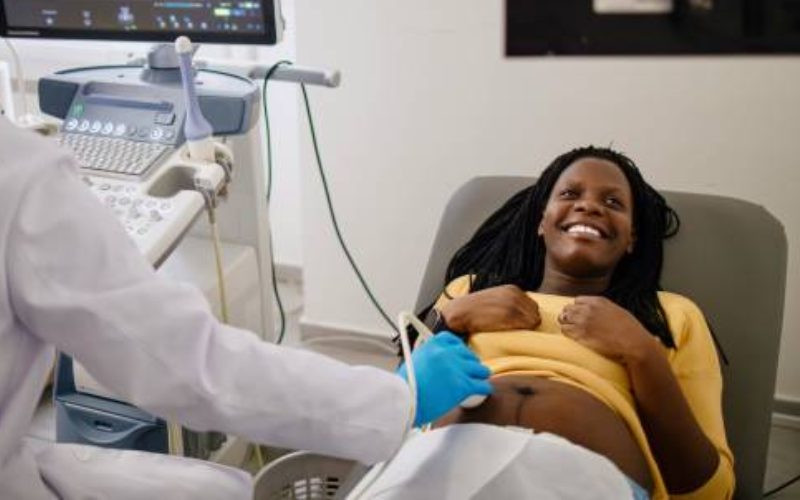
Despite significant gains in the public health sector, Kenya’s maternal mortality remains high at 362 deaths per 100,000 live births, with the mortality of children under five also remaining high.
Urgent action is needed to address this, particularly improving efficiency and access to diagnostic services, which play a critical role in maternal and child health.
Results from a study conducted by JKUAT’s Digital Health Applied Research Centre (DHARC) in Kisumu and Nyeri counties, reveal that the risk for maternal and child mortality in Kenya can be reduced through effective early diagnosis and treatment of key diseases within a well-functioning primary healthcare system.
The study, which was funded by the Foundation for Innovative New Diagnostics (FIND) and supported by the Ministry of Health, mapped out 30 testing services across all six levels of Kisumu and Nyeri Counties to identify gaps and opportunities to strengthen services and improve access to quality healthcare.
The two were counties of interest due to their high prevalence of communicable diseases (malaria and HIV in Kisumu), and non-communicable diseases (hypertension, diabetes and cancer in Nyeri).
The study shows all health facilities mapped lacked a comprehensive laboratory information management system and both had substantially fewer health facilities than needed for their population - a situation, unfortunately, replicated across all the 47 counties.
This is a worrying trend, since health is a devolved function.
The key recommendations to improve diagnostic services across the country include the need to enhance testing capacity for maternal and child health, to meet expectations set in Kenya’s Essential Package for Health. The diagnostic capacity should generally match the disease burden for any county, with public health strengthening being a key priority area for investment.
In order to meet primary healthcare needs, the study further recommended that Kisumu County invests in more Level 2 facilities (an additional 48 facilities) while Nyeri County gets three additional Level 4 facilities to improve access to maternal and child healthcare.
While this may vary from county to county, they need assessment points to a similar trajectory. Nyeri, for instance, has a 47 per cent gap in Level 4 health facilities, while Kisumu has a 42 per cent gap in Level 2 health facilities.
Sample referral policies is another crucial area that needs urgent streamlining to help reduce service distance for counties. The activation of mobile laboratories can come in handy, especially in rural areas with limited access to infrastructure. This is especially viable, since the study indicates that most diagnostic tests for maternal and child health can be done at the ward level (Level 3 facilities). This will further increase public access to specialised testing.
Acting Director-General for Health, Dr Patrick Amoth, concurred that there is need to improve the diagnostics services at Levels 2 and Levels 3 to achieve Universal Health Coverage, especially in the face of the epidemiological transition from communicable diseases to non-communicable diseases.
“Decision-making and policy formulation in health need to be driven by science and empirical data generated from studies like this one,” said Dr Amoth. “Further, health facilities need to interact with each other seamlessly to ensure the health sector leverages on the Information Management Systems.”
The study, for instance, showed that there is a gradual change in the disease patterns in Kisumu, with a noticeable upsurge in non-communicable diseases, suggesting that testing capacity may become strained in the future.
JKUAT’s Prof Simon Karanja said the new scope of the study will evaluate a set of more detailed indicators of diagnostic availability, quality, affordability and access, trackable through a web-based dashboard to provide county governments with evidence-based recommendations to improve diagnostic services.
The second phase of the DHARC study will include reproductive, maternal, newborn, child and adolescence health, communicable and non-communicable diseases plus diagnostics for road traffic accidents across Nakuru, Kilifi, Kisumu and Nyeri counties.
In a nutshell, county governments and relevant stakeholders must deliberately invest in diagnostic services to address maternal and child mortality.
-Wakhu is the Corporate Communications Officer at JKUAT. @wakhustephen
 The Standard Group Plc is a multi-media organization with investments in media
platforms spanning newspaper print
operations, television, radio broadcasting, digital and online services. The
Standard Group is recognized as a
leading multi-media house in Kenya with a key influence in matters of national
and international interest.
The Standard Group Plc is a multi-media organization with investments in media
platforms spanning newspaper print
operations, television, radio broadcasting, digital and online services. The
Standard Group is recognized as a
leading multi-media house in Kenya with a key influence in matters of national
and international interest.











